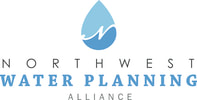|
The Illinois Water Inventory Program (IWIP) develops and maintains a database of high-capacity water wells and intakes from public water supplies, self-supplied industries, irrigation, fish and wildlife, and conservation sectors. But they do much more than collect data. Participation and involvement with IWIP pays dividends for operators, stakeholders, and users alike. IWIP coordinates reporting and data collection on high-capacity water wells and intakes statewide, which are defined as any well or intake that is rated to pump 70 gallons per minute (gpm) or greater, both individually and as a combined measure when multiple wells/intakes are present at one facility. This collection is done primarily through IWIP’s Online Reporting Tool and covers groundwater and surface water uses. Any time invested in actively reporting water use can directly benefit utility managers and their customers. IWIP is reliant on participation by stakeholders, and through higher levels of participation, IWIP can produce more comprehensive and accurate data for use in water supply planning, modeling, and research. The agency has an open-door policy and is eager to collaborate with municipalities, counties, and regions on projects addressing water availability, future challenges to water supply, and higher levels of analysis. Some examples of further data analysis are:
Recently, IWIP, in partnership with the Illinois State Water Survey (ISWS), was deeply involved in developing water demand projections for Joliet which informed decisionmakers and stakeholders about different considerations for their decision to switch water supplies. The agency has also done groundwater studies for Kendall and McHenry counties as well as a detailed investigation of water resources for Kane County. Data provided through the IWIP is strongly interconnected within the Groundwater Flow Model and the state’s ENIGMMA (The Evolving Network of Illinois Groundwater Monitoring and Modeling Analyses) program. These projects demonstrate how the data are implemented in groundwater and surface water science. Comments are closed.
|
ABOUTThe latest updates page features posts about issues affecting NWPA member communities and best practices, drawing on interviews and conversations with experts. Archives
July 2024
Categories
All
|
